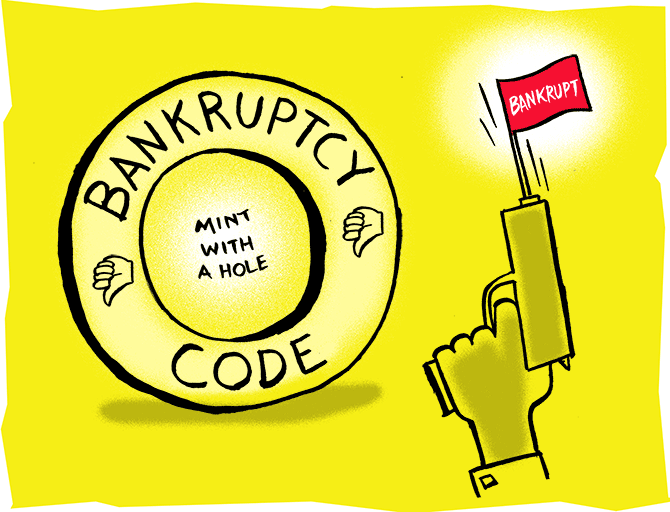IBC-oriented pre-packs, the other mechanism under consideration, are a mix of out-of-court restructuring and a formal insolvency process, say experts.

The temporary suspension of insolvency applications on lockdown-induced defaults has put the spotlight on the corporate debt restructuring schemes in the company law, and the introduction of Insolvency and Bankruptcy Code (IBC)-oriented pre-packs.
Experts, however, are divided on the efficacy of these schemes in their current form.
For the alternative debt resolution mechanism to be effective, the Companies Act, 2013, and the Code need to be amended, they argue.
Section 230 of the Companies Act provides for ‘schemes of corporate restructuring’. According to L Viswanathan, partner, Cyril Amarchand Mangaldas, there are several advantages of using these provisions.
He argues the existence of a “default” is not a pre-condition to initiate the scheme process.
“Companies and their creditors can initiate the process as soon as there are signs of incipient stress, even before a default occurs.
"This may help bank lenders to deal with provisioning requirements in advance,” he says.
Being a collective process, the scheme requires the approval of all classes of creditors.
Sanctioned by the National Company Law Tribunal (NCLT), the scheme is binding on the company and all its creditors and shareholders.
“Unlike the IBC, which is based on a ‘creditor-in-control’ model of insolvency resolution, the scheme process is premised on ‘debtor-in-possession’,” says Viswanathan.
Also, what works in favour of the scheme is that it can be used to implement resolution plans approved under the stressed assets framework of the RBI, say experts.
However, a section of legal experts feels corporate debt restructuring under Section 230 of the Companies Act may have limited value.
“The time taken for approval of schemes of arrangement tend to get extended beyond workable limits because of multiple reasons -- the issues have been similar to those afflicting the corporate insolvency resolution process,” says Rajat Sethi, partner, S&R Associates.
Experts say there is no outer date for the completion of a scheme of arrangement.
“Greater efficiency and faster decision-making will be required for corporate debt restructuring under Section 230 to be a viable option,” says Sethi.
According to Poornima Advani, partner, The Law Point, Section 230 provides for the restructuring of the company’s finances and affairs, but does not allow for a holistic restructuring of its debt.
“The decision-making process is fragmented and can result in one particular creditor holding the entire procedure hostage.”
Many legal experts and insolvency professionals who have closely monitored the working of the insolvency resolution process feel the pandemic-induced suspension of the Code gives promoter groups and managements of debt-laden companies some breathing space and elbow room to manoeuvre their affairs.
“Promoters want any restructuring plan to their advantage and with the suspension of the IBC provisions, they will be more feisty,” says Saurav Kumar, partner, IndusLaw.
Experts also point out that while a scheme is binding on all the creditors and shareholders of a company, it does not expressly override the provisions of taxing statutes, which impose onerous obligations on a company in default.
IBC-oriented pre-packs, the other mechanism under consideration, are a mix of out-of-court restructuring and a formal insolvency process, say experts.
“They potentially incentivise the existing management to revive the company. Arguably, they could provide a better return to creditors then the corporate insolvency resolution process,” says Sethi.
For potential acquirers, there is greater certainty of outcome.
However, in terms of possible negatives, there would be no moratorium in effect when the pre-pack is being agreed upon, say experts.
“The promoters may have an unfair advantage being close to the asset,” says Sethi.
Operationalising of pre-packs will require amendments to the IBC, say experts.
Despite shortcoming, Sethi is in favour of introducing pre-packs in the current situation when certain sections of the Code stand suspended for a limited period.
“It would be more useful to operationalise pre-packs in order to provide a path for parties to explore an out-of-court restructuring and combine it with the certainty of quick court approval,” he says.
Viswanathan, too, feels limitations of the restructuring scheme under Companies Act could be addressed by amendments to Section 230 and the rules made thereunder.
“The Companies Act may be amended to provide that an interim moratorium be imposed automatically at the time of filing the scheme with the NCLT,” he says.
Irrespective of the options that are chosen, all options will require some action from the NCLT.
“To make these options workable, immediate attention is required to augment the NCLT machinery,” says Sethi.
In the post-lockdown period, a clear set of protocols are needed to facilitate the functioning of the NCLT so that it can dispose off matters in the next few months, say experts.
How are others flattening the bankruptcy curve
Most countries have provided a relatively balanced provision to protect against Covid-19-related defaults, while giving enough to lenders against an unwarranted defence, says Saurav Kumar, partner, IndusLaw.
For instance, in Germany, two conditions have to be satisfied by the corporate debtor for a suspension.
First, the reason for insolvency must be based on the effects of the pandemic.
Also under scrutiny would be the prospects of restructuring the company.
In Singapore, to get the benefit of the moratorium, corporate debtors have to prove they were unable to perform a contract because of Covid-19 pandemic.
The United Kingdom has allowed for a much shorter moratorium without the creditor approval.
Unlike India, most countries allow voluntary filings by debtor companies.
“This keeps the window open for consensual restructuring,” says L Viswanathan, partner, Cyril Amarchand Mangaldas.











